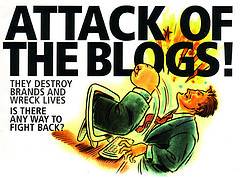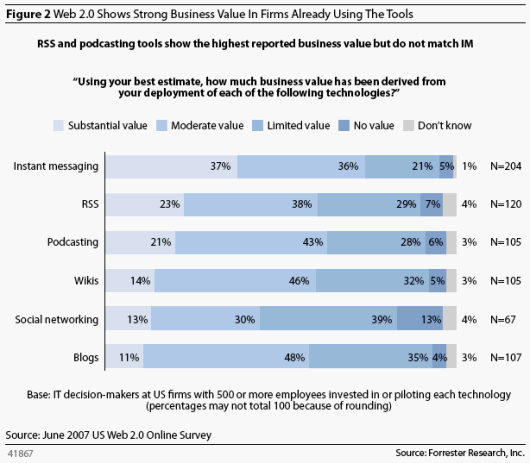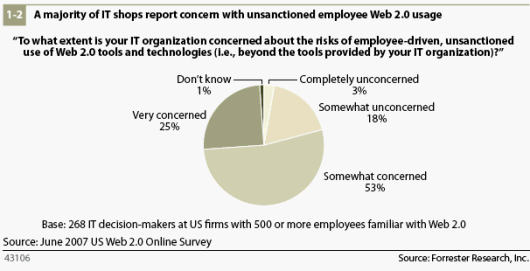Enterprises continue to adopt web technologies and ‘web 2.0’ trends, but there are two common threads to this adoption. One is that web technologies are step-by-step being adopted by enterprises, but they aren’t yet ready to usurp many desktop software apps. The Google Apps vs Microsoft Office debate currently raging is proof of that. The second thread is that enterprises have a fear of web 2.0 tools being mis-used by their employees. I was recently in a TV news segment in my home country, answering the question: should Facebook be banned in the workplace? (for the record, my answer was no!).

Forrester Research has just released two reports that address this ‘fear of Web 2.0’ (my term, not theirs). The first report is entitled ‘Web 2.0 Social Computing Dresses Up For Business‘. The executive summary first neatly defines the value of Web 2.0 in the enterprise:
“ItÄôs the ability to more efficiently generate, self-publish, and find information, plus share expertise in a way thatÄôs so much easier and cheaper than earlier knowledge management attempts.”
However the report goes on to caution that web 2.0 risks (and opportunities) must be assessed in regards to reliability, security, governance, compliance, and privacy – all common concerns in the enterprise. Forrester gets to the nub of the issue a little later in the paper:
“Web 2.0 tools have almost certainly already entered your organization under the radar through unsanctioned employee usage. This raises the stakes and criticality of taking action sooner rather than later.”
The terms “unsanctioned”, “raises the stakes”, and “criticality” all point to a fear that enterprises will be somehow undermined, threatened or taken advantage of by the humble employee. Or perhaps it’s just the garden variety ‘fear of the unknown’.
Embrace Web 2.0 – But On Our Terms
The solution, says Forrester, is to embrace web 2.0 – but “on your terms”. They recommend that companies create “Web 2.0 policies and usage guidelines”. Also companies should bring secure and compliant Web 2.0 tools in-house. This is all sound advice, as long as it’s not taken to extremes – e.g. banning web apps (unless there is a true security or compliance risk – but Facebook for example wouldn’t qualify there), preventing employees from experimenting with new forms of web technologies, or dismissing web 2.0 as having no business value.
Thankfully, it looks like businesses are seeing value in web 2.0 tools and technologies, judging by the following Forrester graph:

Adopting Web 2.0
The second Forrester report sent to Read/WriteWeb was entitled ‘Passionate Employees: The Gateway To Enterprise Web 2.0 Sales‘. It addresses how to get corporate employees to adopt and use Web 2.0 tools – such as blogs, podcasts, wikis, RSS, and social networking – in their daily work lives. While there are always early adopters in any company who will willingly use new Web tools and technologies (I used to be one of them!), there are many more who don’t. Forrester puts the current figure of people using Web 2.0 tools in the enterprise at 15% – and usage is higher at smaller companies.
There could be a lot of reasons why employees don’t use web 2.0 tools. What I found surprising in Forrester’s report was that IT decision-makers appear to be quite happy that only 15% of employees in their company use web 2.0 tools. Consider this passage from the report:
“Seventy-eight percent of the IT decision-makers we spoke with said that their departments were concerned with employees bringing Web 2.0 tools into the enterprise on their own (see Figure 1-2). And why
not? Unsanctioned employee use opens up a PandoraÄôs box of computer security risks, intellectual
property risks, eDiscovery noncompliance, and even potential breach of contract in cases where
customer data leaked outside the firewall. With readily available consumer services Äî think
Google Docs and Spreadsheets and LiveJournal Äî and low entry cost SaaS (software-as-aservice)
solutions Äî think Socialtext wikis and Teqlo mashups Äî there is a lot for IT to fear.”
(emphasis mine)

Conclusion
It’s clear that enterprises, or to be more exact IT decision-makers, still fear web 2.0. Yet they also see the value in it. So their natural inclination is to control the situation – only allow sanctioned web software in and enforce policies that limit use of web 2.0 technologies. That way, IT decision-makers reason, the company still gets the benefits of web 2.0 – but without the risks.
Yet web 2.0 is all about open-ness and collaboration. The latter is particularly important in enterprises. The real reason why IT fears web 2.0, as John Martellaro pointed out recently, is that it upsets the historical need for control and power in IT departments. The above graphs and data points from Forrester show that the reason web 2.0 is finding it difficult to penetrate the enterprise is not that IT can’t see the value in it, but that they fear it may erode their control and power.
The answer may in part be ensuring that web 2.0 tools are secure and compliant, but equally it’s going to take a change in mindset from IT to allow employees to collaborate and experiment. What do you think of the current state of web 2.0 in the enterprise? Have you seen signs that IT is opening up, losing its fear a little?





















